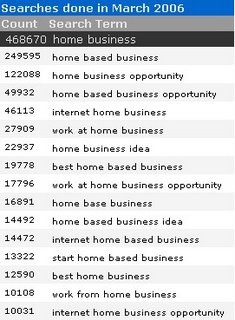Some call it click fraud and some call it invalid click activity, but nobody questions that questionable clicks do happen. How they happen and to what degree might be up for debate, but the existence of industrial-level skullduggery is a widely known but poorly recognized secret of the search marketing industry.
This dirty little secret is made up of hundreds of millions of dollars, which are unevenly split between tens of thousands of participants. Some astute observers might suggest that this constitutes a conspiracy to commit fraud and is therefore illegal behavior. In that, they would be half right. Click fraud isn't actually illegal, at least not in a criminal sense. Not yet anyway.
Google knows about issues associated with click fraud, though it doesn't like using the term "fraud". The popularity of AdWords and ease of access to Google's lucrative AdSense distribution system gave online scammers the two essential elements, motive and opportunity. Google has been playing catch-up ever since.
Yahoo knows a lot about click fraud as well. Extremely credible allegations have been made about Yahoo's commercial connections with click fraud artists. Many in the shadier side of the search marketing industry are in on the click fraud secret as well, so much so that they publish how-to guides and self-congratulatory blogs. Frighteningly, spyware and malware makers are also in on the secret, often benefiting by becoming unwanted content-delivery partners.
Everyone's making a lot of money and, like the great insurance scams of yesteryear, the costs to the ultimate victims are so widely distributed they often seem negligible to individuals affected. Negligible is, of course, a relative term. Is $10 negligible to you? How about $100 or $1000 or more?
Another group of people who've learned a great deal about click fraud are the victims, which tend to be small online businesses. Unfortunately, it is harder to track the impact on smaller businesses because they often lack the resources to properly police their own web and account logs. SEO-News.com editor, Kim Roach, wrote a strong piece titled, "Going Broke on Google AdWords" in SiteProNews last week.
Victims of Click Fraud come in all sizes. While Kim's article addressed damage done to smaller businesses, a July 2006 report by online industry research firm Outsell estimated click fraud accounted for $800 million of a total of $5.5 billion spent on search engine advertising in 2005. Outsell reached these figures by studying 407 online advertisers that collectively controlled about $1 billion in ad spending.
Google disputes these figures along with other figures reported by San Antonio based PPC-auditing firm Click Forensics in their monthly
Click Fraud Index, questioning the methodology used in determining incidents of billed click fraud.
In an August 8, 2006 report (PDF file) titled, "
How Fictitious Clicks Occur in Third-Party Click Fraud Audit Reports" Google's Click Quality Team found two serious issues served to consistently inflate incidents of "fictitious clicks" recorded in third-party analysis.
According to their findings, "The major root causes for fictitious clicks falls into the two following categories: detection of page reloads as ad-clicks," and, "conflation across advertisers and ad networks, or the counting of one advertiser's traffic in another advertiser's reports."
The first cause of "fictitious clicks" noted by Google's team suggests that sometimes users reload pages; use their back buttons, or open landing pages in new windows. Each action could be interpreted as a second, third or fourth click where only one should have actually been recorded.
The second cause of "fictitious clicks" is a bit more confusing, stemming from the massive AdSense system Google uses to distribute AdWords advertising. Google has thousands, (perhaps millions) of AdSense distribution partners. Some of these partners are extremely large corporations, though most are independent webmasters.
The largest of these partners often have complicated advertising systems that mix and match different types of ads (banners, AdWords, text-links, etc...) from different advertising platforms. They have their own internal system for measuring the effectiveness of these ads and sometimes those internal systems cause subtle incongruities in tracking ad-impressions. One such weirdness is the way some hits from the AOL network are grouped together under a single block of IP addresses.
Google's business product manager for trust and safety, Shuman Ghosemajumder, wrote a long post "
About Invalid Clicks" to the Inside AdWords blog in early August. In it, Ghosemajumder suggests that surveys and reports from many click-analysts, including Click Forensics, do not give a full view of factors as seen by Google, or in some cases, by the analysts' own clients.
Ghosemajumder says Google's internal filters catch and cancel charges for the vast majority of invalid clicks, even though evidence of those clicks might be reflected in advertisers' log files.
"If an advertiser is monitoring click activity, these automatically filtered clicks may show up in an advertiser's logs, but not in their bills. When invalid clicks are detected after an advertiser is charged, we reimburse for them. Because of our detection efforts, losses to advertisers from invalid clicks are very small," Ghosemajumder's comments.
"Moreover", he continues, "the study does not indicate whether the advertiser was actually charged for any of the clicks, only that the traffic analysis suggested that the clicks may have been invalid."
It isn't just the number of billed clicks that have advertisers and analysts concerned. Another report produced by Click Forensics showed that of 170 advertisers in the financial services sector, over 6% reported recorded visits from sites clearly identified as parked domains.
Dozens of third-party firms engage in ad-stuffing documents on parked domains. If the general consensus that an invalid click is one that is reasonably unlikely to lead to a potential conversion, then counted clicks from parked domains are assumed by many analysts to be invalid.
Parked domains are housed at URLs that, while owned, are not really operating as most Internet users might expect. A page at parked domain is generally one containing very limited information and a number of PPC Ads. The page is basically a placeholder being used as a billboard.
Believe it or not, parked domains are said to drive a significant amount of traffic, especially under highly searched terms relating to health, travel and financial services. Given the number of click-throughs found in a report covering 170 financial services companies, 6% represents a huge number of clicks, each costing advertisers ten cents or more.
Jessie Stricchiola is considered one of the leading experts in click fraud detection and analysis. On the website of her firm,
Alchemist Media, Sticchiola writes about an automated form of third-party click fraud that was publicly associated with Yahoo by click fraud researcher Ben Edelman.
"Another method of fraudulent clicking is initiated through automated click generation methods, using "hitbots" - software applications specifically designed to click on paid listings. This kind of activity is also initiated by both competitors and by search engine partners and/or affiliates, the latter often instituting extensive technology arrangements to enable their fraudulent click traffic to slip past the internal filtering methods used by the CPC engines.
For CPC affiliates, there is a vested interest in generating as much traffic as possible to increase their portion of the shared revenue generated by paid listings. This is an often overlooked source of fraudulent click activity."The examples cited in this article are only some of the ways used by the unscrupulous to scam unsuspecting advertisers in an environment that is extremely difficult to police properly. Indeed, in the absence of any external oversight, the only real watchdogs are the search engines themselves. Click auditors working with advertisers are, apparently, not privy to information used by Google and Yahoo to examine the issue and, therefore, are unable to effectively create reports recognized by the two largest search advertising providers.
While Google and Yahoo both claim to be working on finding solutions to the problems posed by invalid clicks, both admit they are months or even years from finding foolproof solutions. That both make a great deal of money from invalid clicks, clicks directed from parked domains, and other third-party shenanigans has lead some to speculate that the major search engines might not be approaching the problem with missionary zeal.
There is a lot of murky ground. The only obvious things about the issue is that there is an issue and that a solution, though not immediately forthcoming, is desperately needed.
About the author: Search marketing expert Jim Hedger is one of the most prolific writers in the search sector with articles appearing in numerous search related websites and newsletters, including SiteProNews, Search Engine Journal, ISEDB.com, and Search Engine Guide.
He is currently Senior Editor for the Jayde Online news sources
SEO-News and
SiteProNews. You can also find additional tips and news on webmaster and SEO topics by Jim at the
SiteProNews blog.





